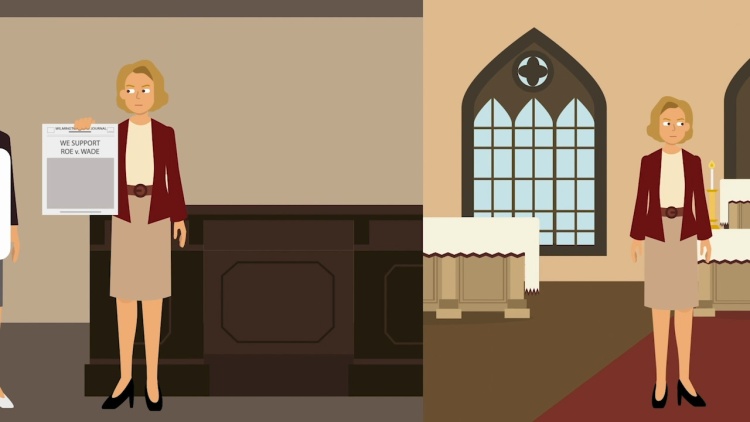Curay-Cramer v. Ursuline Academy
United States Court of Appeals for the Third Circuit
450 F.3d 130 (2006)

- Written by Sara Rhee, JD
Facts
Michele Curay-Cramer (plaintiff) taught four English classes and a religion class at Ursuline Academy (Ursuline) (defendant), a private Catholic school that taught from a Catholic perspective. Curay-Cramer held a pro-choice stance on abortion. On the 30th anniversary of Roe v. Wade, 410 U.S. 113 (1973), Curay-Cramer allowed her name to be published in an advertisement that supported the Roe decision and a woman’s right to choose. After the advertisement was published, Curay-Cramer was called into the office of Barbara Griffin (defendant), the president of Ursuline. Griffin advised Curay-Cramer that Ursuline was considering terminating Curay-Cramer’s employment due to her public support of abortion, which was contrary to Catholic doctrine. Curay-Cramer stated that she had a right to protest the school’s position on abortion without facing termination. Ursuline decided to terminate Curay-Cramer’s employment unless Curay-Cramer publicly renounced the advertisement and declared she was pro-life. When Curay-Cramer refused to do so, Ursuline terminated her employment. Curay-Cramer sued Ursuline, alleging that her termination violated Title VII of the Civil Rights Act of 1964 (Title VII), 42 U.S.C. § 2000e et seq. Curay-Cramer specifically claimed that Ursuline had retaliated against her for opposing the school’s practice of firing employees who had abortions. Curay-Cramer also made a disparate treatment claim, alleging that she was fired because she was a woman, and that men who were similarly situated were treated less harshly despite having views contrary to Catholic doctrine. One of those men was of the Jewish faith, and another was opposed to the war in Iraq. The district court dismissed Curay-Cramer’s complaint. Curay-Cramer appealed.
Rule of Law
Issue
Holding and Reasoning (Roth, J.)
What to do next…
Here's why 899,000 law students have relied on our case briefs:
- Written by law professors and practitioners, not other law students. 47,000 briefs, keyed to 994 casebooks. Top-notch customer support.
- The right amount of information, includes the facts, issues, rule of law, holding and reasoning, and any concurrences and dissents.
- Access in your classes, works on your mobile and tablet. Massive library of related video lessons and high quality multiple-choice questions.
- Easy to use, uniform format for every case brief. Written in plain English, not in legalese. Our briefs summarize and simplify; they don’t just repeat the court’s language.





